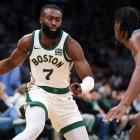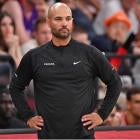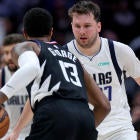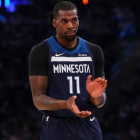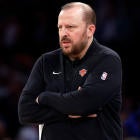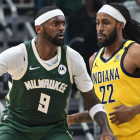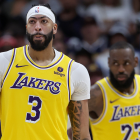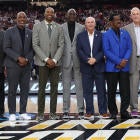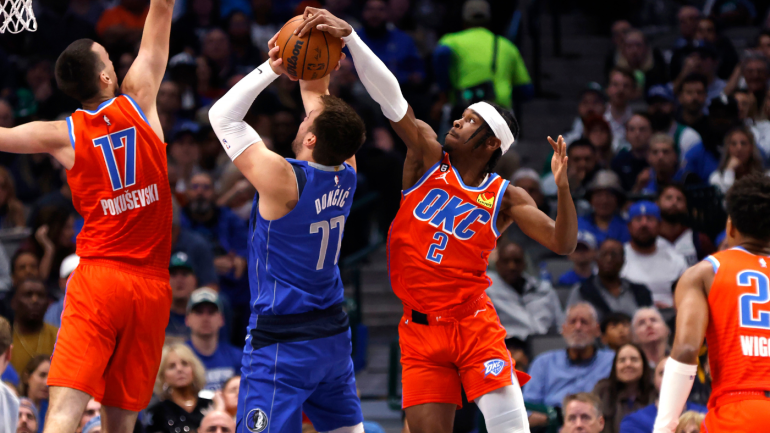
Whenever Shai Gilgeous-Alexander fails to get around a screen, his best friend is on his case. And he doesn't want to hear it anymore.
Gilgeous-Alexander cannot, however, credibly tell his buddy to keep his mouth shut. Luguentz Dort, his Oklahoma City Thunder teammate, is one of the NBA's premier perimeter defenders.
"He's over there doing it," Gilgeous-Alexander said. "I can't have him yell at me for not doing it, so I gotta do it."
Gilgeous-Alexander said this at Madison Square Garden on Saturday, after humiliating the Knicks to the tune of 37 points on 13-for-22 shooting. The main reason his name is at the tip of seemingly everybody's tongue -- and the top of every list of early Most Improved Player candidates -- is that his offense has been outrageous. The most mind-boggling thing about his first four weeks, though, is that his defense has taken off, too.
To say that Gilgeous-Alexander has made The Leap to superstardom isn't exactly incorrect, but it's inadequate. The 24-year-old has taken a series of separate steps, which have collectively brought him closer to the top of the mountain. He is scoring more than Kevin Durant, shooting free throws better than Stephen Curry, finishing better than Joel Embiid and (for the third straight season) driving more than anybody, but none of this -- nor his increased usage -- has prevented Gilgeous-Alexander from exerting more energy on the other end.
In the third quarter at MSG, Gilgeous-Alexander slithered around a screen and snatched the ball from Cam Reddish, who made the mistake of trying to split the pick-and-roll, then went coast for an easy layup:
If Reddish was surprised, he shouldn't have been. Gilgeous-Alexander's wingspan is half an inch shy of 7 feet. "His length and disruption have been huge for us in terms of deflections and [forcing] turnovers," Thunder coach Mark Daigneault said. He is particularly dangerous when you think you've turned the corner on him; just ask Fred VanVleet, Franz Wagner and Reggie Jackson:
Oklahoma City forward Kenrich Williams said it was clear in scrimmages before the season started that Gilgeous-Alexander had returned a different kind of defender. "You could see he's taking pride in that side of the ball," he said. "It's carrying over to the games." Dort used the same phrasing -- "he's started taking a lot of pride in it" -- and added that "Shai's got great hands, he knows where to be and he's getting way better."
"I'm always challenging him to get a block and two steals a game," Williams said, and Gilgeous-Alexander doesn't flinch. "Dude thinks he can do anything. He literally thinks he can do anything."
Through 13 games, Gilgeous-Alexander's confidence has not been misplaced. He's second in the league in steals (2.1 per game, up from his career high of 1.3 last season) and among non-bigs he's first (or second, depending on how you categorize Durant) in blocks (1.5 per game, up from his career high of 0.8). He has averaged more combined "stocks" than all but one player and more deflections than all but four.
"He's been locked in," Williams said.
Gilgeous-Alexander said his development on defense is partially the result of improved conditioning. He has been better at navigating screens and making the multiple-effort plays that coaches love:
His length allows him to cover ground the way few guards can, so he has always had occasional highlights. Now they're happening far more often, with fewer errors of inattention in between them. Virtually every game, Gilgeous-Alexander does something startling, whether it's blocking a 3-pointer, stuffing a 7-footer at the rim or sticking his hand in a passing lane at the exact right time:
He has also held up better one-on-one:
Twice, Gilgeous-Alexander has caused a turnover by "pulling the chair" on an opponent, using the same craftiness and body control he's known for when the ball is in his hands:
Dort said that the Thunder needed their leader and best player to "step it up," and he has. Williams said that Gilgeous-Alexander "knows that he can't get away with being lackadaisical on that side of the ball" because "the whole team and the coaching staff" hold him accountable. According to Daigneault and Gilgeous-Alexander himself, though, this growth is primarily the result of him putting the onus on himself.
"I wanted to be reliable on both ends of the ball," Gilgeous-Alexander said. "The best players in the NBA are reliable on both ends of the ball, for sure. And ultimately that's what I want to be."
Daigneault said that defense is "just one area where he's gotten better for us this year." The coach of the league's youngest team believes that improvement is a skill, and that Gilgeous-Alexander "just kind of evolves and gets better and better and better" because he is "very self-reflective" about his game.
"For a guy that has many distractions available to him, he's got a pretty singular focus about becoming a great player," Daigneault said. "And so every time he's got time and space, he comes back better. And he does so in a very self-driven way. He doesn't need a lot of guidance and direction. He wakes up in the morning with a sense of purpose."
So far this season, the Thunder's halfcourt defense ranks seventh in the league, per Cleaning The Glass, and it has been 3.3 points per 100 halfcourt plays better with Gilgeous-Alexander on the court than without him. They've forced turnovers more frequently than all but three teams, and, in the 353 minutes that Gilgeous-Alexander has shared with Dort, they've allowed 105.4 points per 100 possessions, just a few percentage points higher than the league-best Milwaukee Bucks. If this stuff is sustainable, then the future of Oklahoma City's defense is beyond bright, with No. 2 pick Chet Holmgren on track to return from a foot injury and patrol the paint at the beginning of next season.
Perhaps more significant, though, is what this might mean for the rest of the Thunder. Gilgeous-Alexander is never going to be as sturdy or switchable as Dort, but, if he's the type of defender who masks teammates' shortcomings, rather than one who needs teammates to mask his, it radically changes the kind of lineups they can use.
"The thing I've always respected about him: For a very young person, he sees the big picture," Daigneault said. "And his defense is just one way of seeing the big picture because the better he can defend, the better the matchups he can take on, the more it unlocks our ability to put different guys on the court with him and be creative here and also unlocks Sam [Presti]'s ability to put different guys on the roster. It really opens things up."
The best players on the planet tend to be able to dominate on offense without taking anything off the table defensively, allowing their teams to be as flexible with lineups and schemes as they need to be in the playoffs. That this is not an immediate concern for Oklahoma City only makes Gilgeous-Alexander's progress more impressive. He is at the stage, Daigneault said, where he is "growing into a leader" and "starting to take responsibility not only for himself but for the team." Given his aspirations, the calculus was easy.
"Whatever it takes, I wanted to do," Gilgeous-Alexander said.














